Personal experience: how I turned my love for eclairs into a business
His Work / / January 07, 2021
Alexandra Lamm started baking for fun, but over time, the hobby grew into a business. She studied in France, learned how to cook delicious eclairs, and now every day she fills the window of her own confectionery in Moscow with them. We talked with Alexandra and figured out how to survive the fall of a three-tiered wedding cake, open a confectionery with a start-up capital of 500,000 rubles and create desserts that guests will love.

Alexandra Lamm
Founder of Lamm's confectionery.
Cravings for manual labor and an office in your own kitchen
I studied at the Faculty of Journalism of Moscow State University, but working with text after graduation quickly bored me. I decided to take up administrative work and in 2011 I got a job at Afisha as a personal assistant. I liked it, but I felt that I wanted to work with my hands, so I started making cupcakes, cupcakes and simple biscuit cakes at night. Baking provides endless possibilities for creativity, and on top of that it also brings the whole family around the table. I decided: this is what you need, because I love to create beauty and transform everything that I touch.
I am quite a sociable person, so my colleagues were the first customers. In addition, I photographed all the desserts and posted them on Instagram. At that moment, a fashion for everything home began to appear. Friends ordered cakes and cupcakes, treated friends, and my popularity grew thanks to word of mouth. In 2013, I realized that I get less and less pleasure from working in the office, but I enjoy baking. So I finally settled in my own kitchen and began to devote almost all of my time to confectionery.
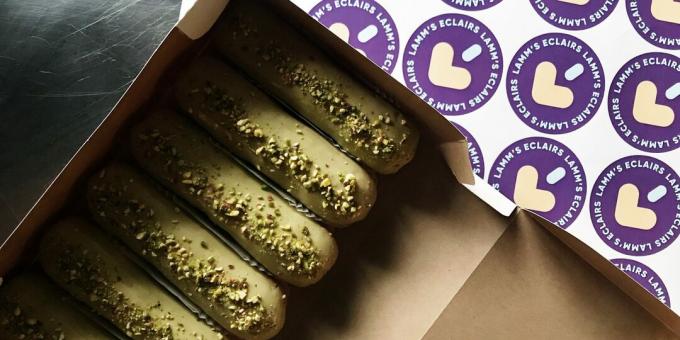
I was a typical artisan entrepreneur who invests all the money in his business or spends it on his own needs. The income, depending on the month, ranged from 70,000 to 200,000 rubles. The most productive time is summer with a huge number of weddings, as well as New Year and spring holidays. There were practically no expenses, because I did not pay for rent and didn't invest in marketing. The only costs are 6% income tax, product costs and utility bills.
A failed cupcake sale and a fallen wedding cake
There were a lot of satisfied clients, but from time to time there were also failures, from which I learned. All the failures were due to lack of experience and insufficiently developed sense of responsibility. One of the brightest is the fallen three-tiered wedding cake. I cooked it, strengthened it, gave it to the driver and started cleaning the kitchen. A few minutes later, the bell rings. I confidently pick up the phone, hoping that the bride wants to thank for the delicious cake, but everything turned out differently. Instead of "thank you", I heard a bunch of mat and screams about a spoiled holiday.
It was difficult for me to understand what was happening, so I phoned the driver.
It turned out that the lower tier cracked and the cake tilted during transportation, like the Leaning Tower of Pisa.
Due to nervousness, I got numb, so I just mumbled and didn't know what to do. Then I got together and we solved the problem: the confectioners from the restaurant brought the two upper tiers to the newlyweds, and the destroyed lower one was served and served on plates. True, we were still fined 50%. It is not hard to guess that I went into negative territory.
Another significant failure for me was associated with an order for 800 cupcakes for a well-known company. I accepted it, but did not have time to complete it, so I delivered only half of the desserts late. As a result, I was fined 50%. I remember that then I went into such a terrible minus that even there was nothing to pay for the apartment.
Burnout and love for eclairs
For three years a young man helped me, and then we parted. I went on a trip to lick my wounds and there I met my future husband, who at that time was living in Germany. As soon as I returned to Russia, it became clear that baking is now much more difficult: I have to take orders alone, buy food, bake cakes, collect cakes and communicate with couriers. For six months of such work, I emotionally burned out and I realized that the pastry business just makes me sick. It was lucky that just at that moment the young man proposed to me.
While preparing the documents for the move, I started organizing "sunny bachelorette parties" - chamber master classes for girls. They allowed me to take a break from endless orders and teach others everything that I could do. After moving to the oven, I didn't even want to look. Many said it would pass, but I didn't believe it. As a result, it happened: my husband gave me a trip to Paris for a master class at the culinary school Le Cordon Bleu and I came to life. From that moment on, I seriously thought about my own confectionery in Moscow - it was more difficult to open it abroad.
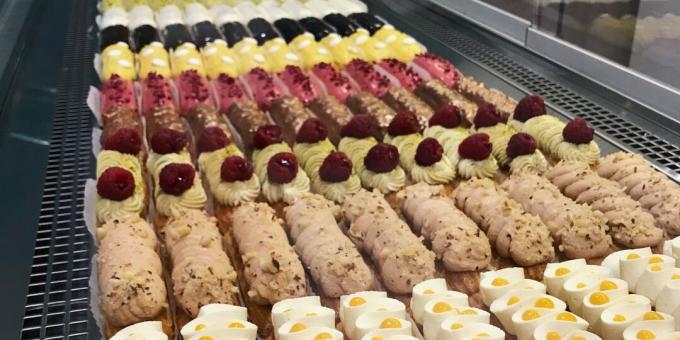
Before moving to Germany, I made two main desserts - biscuit cakes and cupcakes. Over time, it became clear that these products lost their uniqueness, because many learned how to make them. Then I decided to shift the focus to eclairs and it was right, because it was they who quickly began to gain popularity among customers and turn into a trend.
Fans and need for a point of sale
In 2017, my husband and I returned from Germany to Moscow with the specific goal of opening a corner (a small shop. - Approx. Ed.) in the food mall "Depot", which was only then in its infancy. True, at a meeting with investors, it turned out that after the first tasting of the product, only numbers were announced to us, and now they have changed: you need to pay a large entrance fee and sign an agreement that includes all kinds of fines. So we realized that "Depot" was not our option, and started looking for another premises. The process dragged on for almost a year. All this time my husband and I continued bake at home, because you had to somehow earn money.
I made eclairs and more and more studied the nuances of their preparation: I went to master classes and experimented. By the summer of 2018, it turned out to work out the main line of desserts, with which we entered food markets. My Instagram at that time was already quite popular: I talked there not only about baking, but also about how we met my husband. We have a romantic story that immediately caught on to many girls. So a loyal audience was formed, which was ready to come just to watch us live.
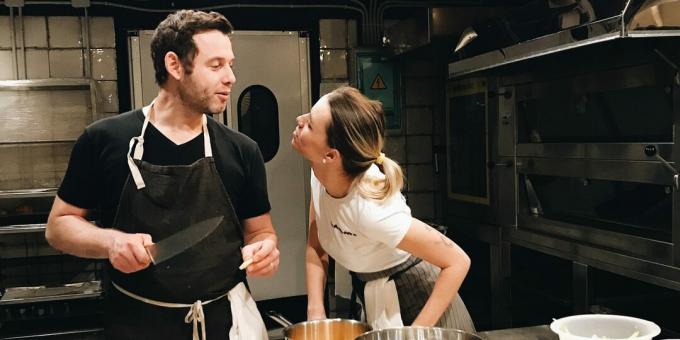
Gigantic crowds lined up near our shop in the markets. My husband and I hugged the guys, took pictures and sold 1,500 eclairs in two days. This is a very good result. From that moment it became clear that our product is popular because it is beautiful, tasty and backed by a good story. Despite the fact that many people tried to persuade us to develop delivery and go digital, we abandoned this idea. I wanted to see our guests, smile at them, communicate. So the realization came that we still need our own physical point.
Museum search for cooperation and lender support
At the end of the summer of 2018, we calculated how much money would be spent on opening a candy store, and realized that it was too expensive. Then we started thinking about a small corner at the museum, because that would help save on rent. In addition, it seemed that our target audience often appears in such places. I love collaborative concepts: floral in a coffee shop or a dessert display in a bookstore. The main thing is that the two components are harmoniously combined, because hardly anyone will buy eclairs near the car wash, but in the museum they will.
For a long time we could not choose a suitable place, but managed to find a creditor - not a bank, but an individual who agreed to give us 3 million rubles. This money, together with our starting capital of 500,000 rubles, should have been enough to place furniture, make repairs, buy equipment, pay rent and set aside a small amount as a pillow security. We already had a workshop for production: we filmed equipped room when participating in summer markets.
We agreed that we would start repaying the loan from January, but in October we did not even have a place for a future confectionery. My husband and I started to panic. Once again examining the options on all kinds of popular services, we found a separate room. There used to be a pastry shop there too. I saw her every day when I was heading home from the Afisha office, so it seemed to me that this was fate. So we moved from a small corner to the concept of a full-fledged establishment.
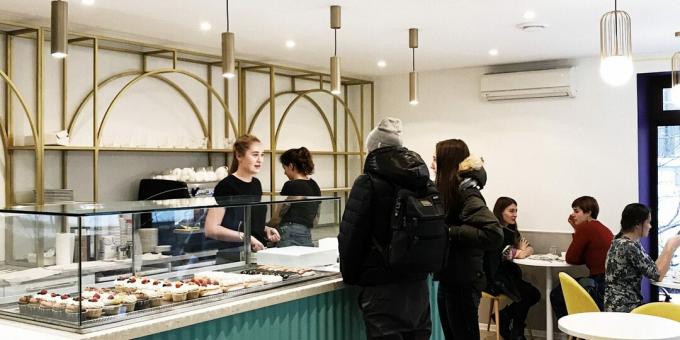
Opening costs and craving for delights
Incorrect calculations were a big mistake. Having your own premises is not as profitable as putting a small shop in a finished one. I had to do repairs, install a fire alarm, supply electricity, draw up a design project, order furniture.
We wanted our pastry shop to be really beautiful, but we were stunned by how much it would cost us.
I pawned 250,000 rubles for furniture, and as a result, for this money, we purchased only one rack without a showcase.
As a result, we had to borrow another 500,000 rubles from relatives in order to be able to open in test mode on December 23, 2018.
Costs strongly depend on the concept, so you don't have to bother like us: buy chairs at Ikea, wooden tables at Avito and sell buns. We wanted to make everything more refined, so the costs amounted to 4 million rubles. Of these, about a million is a special hearth oven necessary for making eclairs. If you make other desserts, costs will be significantly reduced. I believe that 3 million will be enough to open a small 40-square-meter confectionery in Moscow.
Assortment and team
We focus on eclairs, but in parallel with them we sell six types of cupcakes and three types of pastries. This is a fallback and alternative for those who don't know what Lamm's are and just want to have a cup of coffee with something hearty and inexpensive.
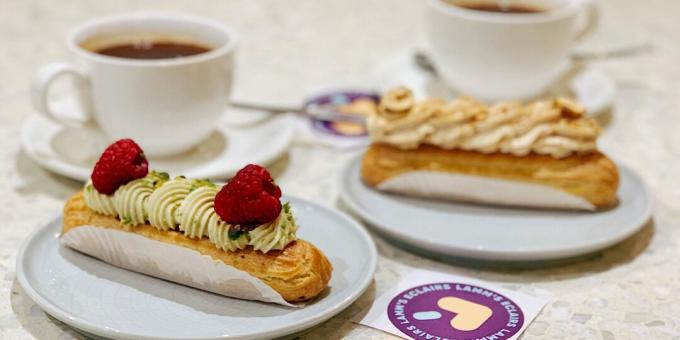
The showcase contains nine types of eclairs as standard. The lines change with the season, but the three flavors from the collection always remain the same: vanilla, chocolate and salted caramel. The latter option is especially popular in Russia because it is sweet, satisfying and very understandable. In the fall, we offered our guests six seasonal flavors: lemon, sea buckthorn and white chocolate, blackberry and lavender, tiramisu, roasted hazelnuts and figs. The most popular was the sea buckthorn eclair, it cost 280 rubles. The winter line was launched on December 7.
We have not worked together for a long time. We are assisted by a team that consists of two baristas, two consultants, four pastry chefs and two shop assistants, a weekday and weekend administrator, a designer, a cleaner and an accountant.
Work on eclairs begins at seven in the morning. The girls decorate the blanks, pack them, mark and send them for delivery from the workshop to the institution. So by 10 in the morning, fresh pastries are already on the window. Then a list of eclairs is made for the next day and the process of baking the blanks begins, which are filled with filling and glazed. In the evening they are left in the refrigerator, and the next morning they are decorated and taken back to the pastry shop.
The ingredients for a delicious dessert
A quality dessert that people will definitely like must meet three criteria. The first is the great ingredients. We use high-quality butter, good flour, natural Tahitian and Madagascar vanilla pods, one hundred percent French fruit puree and not even Belgian, but Swiss and French chocolate, which is best suited for our desserts. This approach brings prices to the appropriate level, but we are not ready to sacrifice quality.
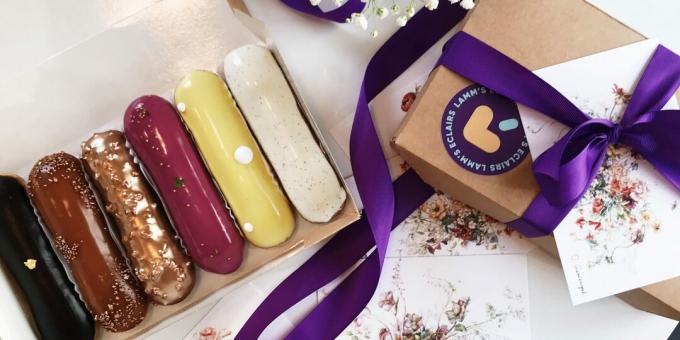
The second moment, which plays an important role, is the cooking technology. Unfortunately, many desserts in Russia are not brought to perfection: they are made at random. Sometimes confectioners come to me who, glazing an eclair, allow themselves the phrase: "And so it will do!" This is a big problem, because when you make a product for 280 rubles, no negligence is allowed. It should be perfect.
The third rule is the freshness of the food. The sale period for a custard product should not exceed 18 hours. Anything that is not sold during this time should be written off. This is what we do. Every morning new eclairs arrive at the pastry shop. Even if there is an ordinary cream of butter with condensed milk inside, it will still be tasty, because the best dessert is fresh.
Profit and costs
A good indicator of the profitability of the gastronomic business is 20%. Unfortunately, we have not yet reached this figure. At the very beginning, people poured into us and the indicators were very worthy, but we were so carried away by sales that we forgot to provide the necessary documents to the tax. As a result, we had to pay 420,000 rubles - unrealistic figures, because we actually did not earn that much. This is just a consequence of our negligence.
As soon as we paid off the debt, we first had a cash gap, and since then we have been living without profit.
There is barely enough money to pay off a loan. In addition, we give 400,000 rubles for renting a workshop and a confectionery, 500,000 rubles goes to the payment fund labor, 35,000 rubles - for utility bills and another 550,000 rubles - the cost of raw materials together with packing. We leave about 20,000 rubles a month for other expenses.
In October, we went into negative territory by 123,000 rubles. However, we really hope that the holidays will correct the situation. Seasonality plays an important role in the confectionery business. Between December and March, you can earn enough to last for the rest of the year, so we are optimistic.
Life hacking from Alexandra Lamm
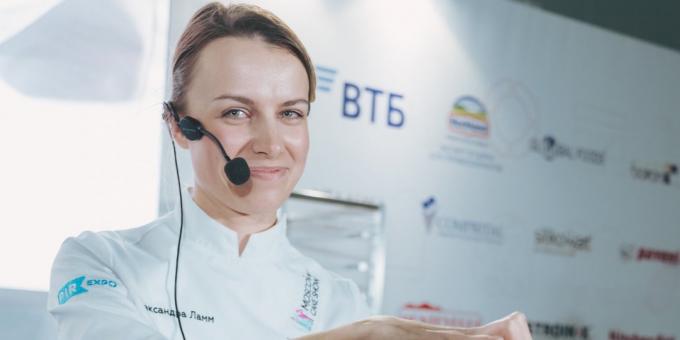
- Start with a concept: you need to be very clear about what, to whom, how, how much and for how much you will sell. The concept should be as dry as possible, without emotional attacks like “cute family bakery”. It should reflect the essence of your business in a few sentences. In any difficulty, first look at the file with your concept and only then make a decision.
- Assess all risks from the very beginning and start from the most pessimistic scenario in terms of finance. Mistakes are best made on paper. Constantly ask the question "What if?" and be ready to answer it. Money is fuel. If you have no sales, you have to close. Such a stubborn fact.
- When hiring employees pay attention to personal qualities, not just professional ones. Catering has a monstrous turnover, so it is important to monitor the team atmosphere and react with lightning speed. Keep in mind: people will leave anyway. You need to take this fact for granted and part with them with a smile and a calm heart.
- Do not under any circumstances deceive your guests' trust. Reputation is subtle matter. When difficult times come, I really want to start saving - quality always suffers from this. Think differently: not how to spend less, but how to earn more.
- Remember: the only difference between a good entrepreneur and a bad one is that the good one got up after another fall, and the bad one remained lying. Without love for your work and faith in yourself, it is impossible to cope with the difficulties that fall on the shoulders of those who decided to change the world.
Read also🧐
- Personal experience: how I opened a musical instrument store
- Personal experience: how I launched a clothing selection service for 50 thousand rubles
- What taxes and insurance premiums an individual entrepreneur must pay

